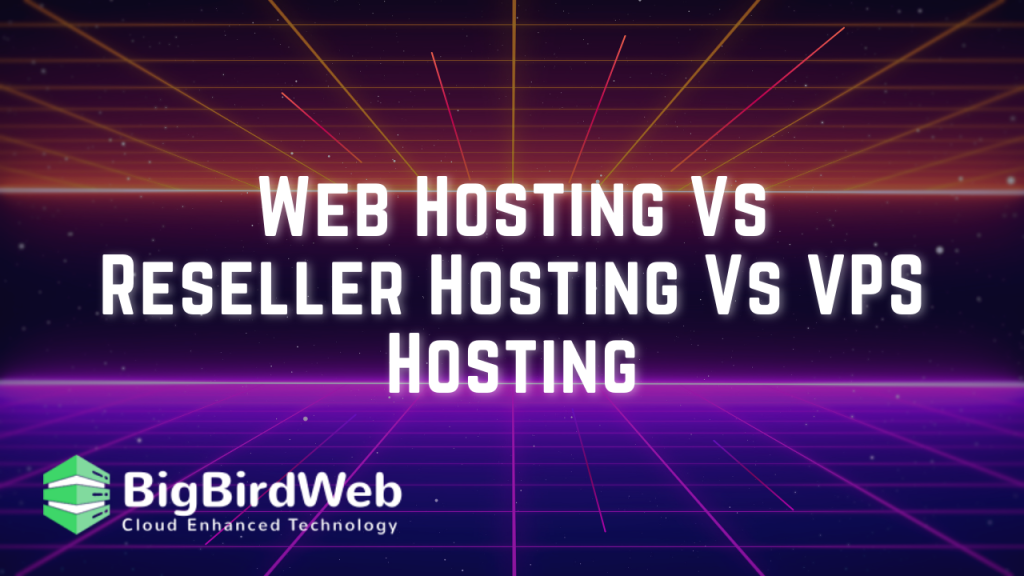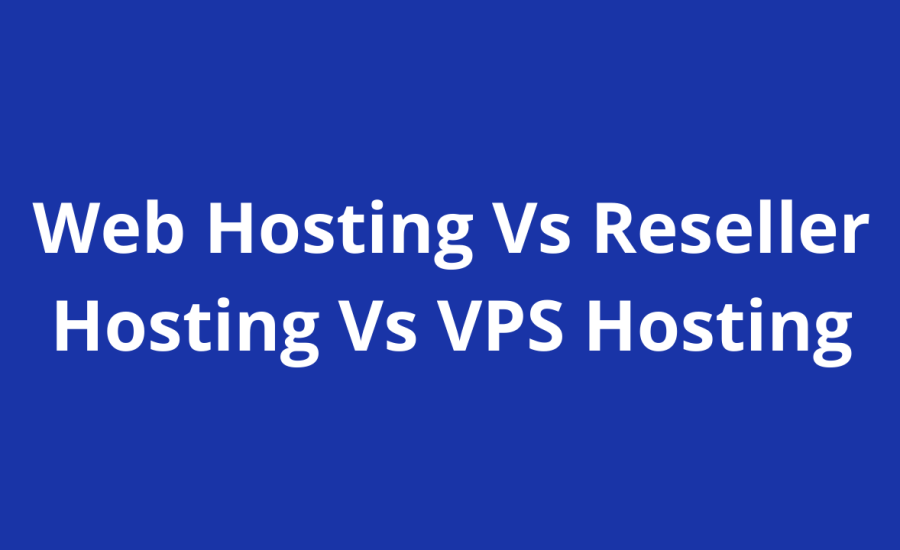Introduction
Choosing the right hosting solution is crucial for the success of any online venture with the Best Reseller Hosting. Whether you’re starting a personal blog, running a business website, or considering a hosting business, understanding the differences between Web Hosting, Reseller Hosting, and VPS Hosting can help you make an informed decision. In this guide, we’ll break down each type, their advantages and disadvantages, and help you determine which is best suited for your needs. We’ll also cover essential FAQs and provide bonus content to further enhance your understanding.

Table of Contents
Web Hosting
Web Hosting is the most basic and common form of hosting, suitable for beginners and small websites. It involves storing your website files on a server maintained by a hosting provider. When someone types your website URL into their browser, the server delivers those files to their device, allowing them to view your site.
Advantages of Web Hosting
- Affordability: Web Hosting plans are typically the most affordable, making them ideal for individuals and small businesses with limited budgets. You can also choose free web hosting.
- Ease of Use: Most Web Hosting providers offer user-friendly control panels like cPanel or Plesk, making it easy to manage your website without technical expertise.
- Maintenance: The hosting provider handles server maintenance, security updates, and backups, allowing you to focus on your website’s content and growth.
Disadvantages of Web Hosting
- Limited Resources: Since multiple websites share the same server, resources like CPU, RAM, and bandwidth are limited, potentially affecting your site’s performance during traffic spikes.
- Less Control: With Web Hosting, you have limited control over server settings and configurations, which can be a drawback for advanced users needing specific customizations.
- Scalability Issues: As your website grows, you may outgrow the resources provided by your Web Hosting plan, necessitating an upgrade to a more robust hosting solution.
Reseller Hosting
Reseller Hosting allows you to purchase hosting resources from a provider and then resell them to your clients as a hosting business. This is an excellent option for web developers, agencies, and entrepreneurs looking to offer hosting services without managing the physical servers themselves.
Advantages of Reseller Hosting
- Business Opportunity: Reseller Hosting provides a lucrative business opportunity by allowing you to offer hosting services under your brand, complete with custom pricing and packages.
- Scalability: You can start with a basic plan and gradually upgrade as your client base grows, making it a scalable solution for your business.
- Management Tools: Most Reseller Hosting plans include management tools like WHM (Web Host Manager) to easily manage multiple client accounts and resources.
Disadvantages of Reseller Hosting
- Initial Investment: While more affordable than setting up your own servers, Reseller Hosting still requires an initial investment in hosting resources and marketing to attract clients.
- Technical Knowledge: Although you don’t manage physical servers, you still need a good understanding of hosting management to provide quality service to your clients.
- Responsibility: As a reseller, you are responsible for your clients’ hosting experience, including support, uptime, and troubleshooting, which can be time-consuming.
VPS Hosting
VPS (Virtual Private Server) Hosting offers a middle ground between shared hosting and dedicated servers. It involves partitioning a physical server into multiple virtual servers, each with dedicated resources, providing greater control and performance.
Advantages of VPS Hosting
- Dedicated Resources: With VPS Hosting, you have dedicated CPU, RAM, and storage, ensuring consistent performance and better handling of traffic spikes.
- Control and Customization: VPS Hosting grants you root access, allowing you to install and configure software, customize server settings, and optimize performance to suit your needs.
- Scalability: VPS plans are highly scalable, allowing you to easily upgrade resources as your website or business grows without significant downtime or migration hassles.
Disadvantages of VPS Hosting
- Cost: VPS Hosting is more expensive than Web Hosting due to the dedicated resources and increased control it offers.
- Technical Expertise: Managing a VPS requires technical knowledge, including server administration, security, and troubleshooting, which might be challenging for beginners.
- Maintenance: While you have more control, you are also responsible for maintaining and securing your VPS, which can be time-consuming and complex.
Comparing Web Hosting, Reseller Hosting, and VPS Hosting
To help you decide which hosting solution is right for you, here’s a quick comparison based on key factors:
| Feature | Web Hosting | Reseller Hosting | VPS Hosting |
|---|---|---|---|
| Target Audience | Beginners, Small Sites | Entrepreneurs, Agencies | Growing Sites, Tech-Savvy Users |
| Cost | Low | Moderate | Higher |
| Resources | Shared | Shared, Customizable | Dedicated |
| Control | Limited | Limited to Moderate | Full |
| Scalability | Limited | High | High |
| Technical Knowledge | Minimal | Moderate | Advanced |
Best Reseller Hosting
When it comes to finding the best reseller hosting, it’s important to consider the provider’s reliability, support, and features. Look for hosts that offer:
- Uptime Guarantee: Ensure the provider offers at least a 99.9% uptime guarantee to keep your clients’ websites accessible.
- Customer Support: Opt for a host with 24/7 customer support to assist you and your clients with any issues that may arise.
- White Labeling: Choose a provider that allows you to brand the hosting services as your own, enhancing your business’s professionalism.
- Flexible Plans: Look for hosting plans that can scale with your business, providing room for growth without major disruptions.
Some of the best reseller hosting providers include:
- SiteGround: Known for excellent customer support and performance, SiteGround offers robust reseller hosting plans.
- A2 Hosting: A2 Hosting provides high-speed performance, free SSL, and a user-friendly control panel, making it a popular choice for resellers.
- InMotion Hosting: InMotion Hosting offers reliable reseller hosting with free WHMCS, cPanel, and SSD storage for optimal performance.
FAQs
What is the main difference between Web Hosting and Reseller Hosting?
Web Hosting is for hosting your own website, while Reseller Hosting allows you to host multiple clients’ websites and resell hosting services.
Can I upgrade from Web Hosting to VPS Hosting?
Yes, most hosting providers offer seamless upgrades from Web Hosting to VPS Hosting as your website grows and requires more resources.
Do I need technical knowledge to manage VPS Hosting?
Yes, managing VPS Hosting requires a good understanding of server administration, security, and troubleshooting.
What is the best reseller hosting provider?
The best reseller hosting provider depends on your specific needs, but popular options include SiteGround, A2 Hosting, and InMotion Hosting.
Is Reseller Hosting profitable?
Reseller Hosting can be profitable if you attract and retain clients by providing reliable services and excellent customer support.
Bonus Content: Tips for Choosing the Right Hosting Provider
- Evaluate Your Needs: Consider your website’s current and future needs, including traffic, resource requirements, and technical expertise.
- Read Reviews: Research customer reviews and testimonials to gauge the reliability and performance of potential hosting providers.
- Test Customer Support: Reach out to customer support with pre-sales questions to assess their responsiveness and helpfulness.
- Check for Hidden Costs: Ensure there are no hidden fees for essential features like backups, SSL certificates, and domain registration.
By understanding the differences between Web Hosting, Reseller Hosting, and VPS Hosting, you can make an informed decision that aligns with your goals and technical capabilities. Remember to consider factors like cost, control, scalability, and technical knowledge when choosing the best hosting solution for your needs.
